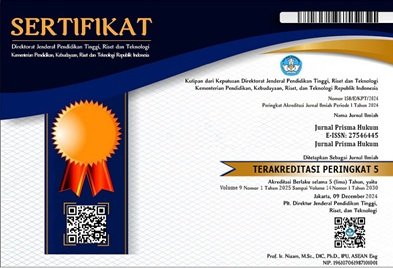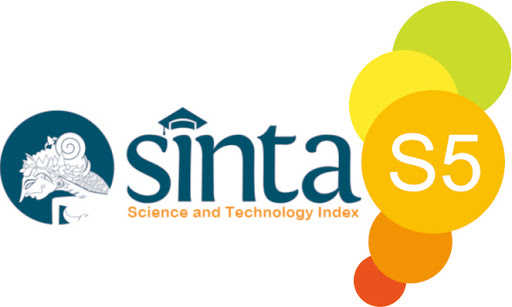REINTERPRETASI PUTUSAN MAHKAMAH KONSTITUSI TERHADAP PASAL 10 UNDANG-UNDANG HAK CIPTA DARI HAK EKONOMI YANG DIPEROLEH PENCIPTA
Kata Kunci:
Platform Layanan Digital Berbasis Konten Buatan Pengguna, Tempat Perdagangan, Pasal 10 Undang-Undang Hak Cipta, Putusan Mahkamah Konstitusi No. 84/PUU‑XXI/2023, Interpretasi Sistematika Hukum, Hak Ekonomi Pencipta, Hak Non‑KomersialAbstrak
Permasalahan hukum timbul akibat persamaan antara platform layanan digital berbasis UGC dengan tempat perdagangan sebagaimana dimaksud dalam Pasal 10 Undang Undang Hak Cipta, seiring dengan putusan Mahkamah Konstitusi terkait perlindungan hak cipta. Fenomena ini mendorong penulis untuk melakukan reinterpretasi terhadap Pasal 10 UUHC, yang dimulai dengan interpretasi istilah tempat perdagangan, dilanjutkan dengan interpretasi atas platform digital berbasis UGC, serta penafsiran terhadap hak ekonomi dan hak non-komersial. Oleh karena itu, tujuan penelitian skripsi ini yakni pertama, menelaah perbandingan kedudukan platform layanan digital berbasis UGC sebelum dan sesudah putusan Mahkamah Konstitusi. Kedua, merumuskan interpretasi ideal terhadap Pasal 10 UUHC dalam konteks dimaksud. Jenis penelitian ini dapat digolongkan ke dalam jenis penelitian hukum normatif yakni meneliti sejumlah peraturan perundang-undangan yang berkaitan dengan tempat perdagangan, platform layanan digital berbasis UGC, dan hak ekonomi pencipta. Analisis difokuskan pada pasal-pasal yang mengandung kaidah hukum. Konstruksi pemaknaan dilakukan dengan cara mengelompokkan pasal-pasal tersebut berdasarkan konsep-konsep sistem hukum, yang dikenal sebagai interpretasi sistematika hukum. Hasil penelitian ini adalah sebagaimana berikut. Pertama , platform layanan digital berbasis UGC memiliki kesamaan fungsi dengan tempat perdagangan karena keduanya berkontribusi terhadap peningkatan nilai ekonomi, hal ini diperkuat melalui konsiderasi MK dan metode konstruksi hukum. Kedua, melalui pendekatan sistematika hukum, eksistensi platform layanan digital berbasis UGC dapat dipersamakan dengan tempat perdagangan, dengan catatan bahwa karya cipta yang bersifat komersial dan menimbulkan pendapatan tidak masuk dalam klasifikasi non‑komersial. Hal ini berarti terdapat harmonisasi antara kebebasan berekspresi dan peningkatan aspek finansial.
Legal issues have arisen due to the equation of digital service platforms based on User Generated Content (UGC) with “places of commerce” as referred to in Article 10 of the Copyright Law, particularly following the Constitutional Court’s ruling concerning copyright protection. This development prompted the author to reinterpret Article 10 of the Copyright Law, beginning with an interpretation of the term “place of commerce,” followed by an analysis of UGC-based digital platforms, and concluding with the interpretation of economic rights and non-commercial uses. This thesis aims, first, to examine the comparative legal standing of UGC-based digital platforms before and after the Constitutional Court’s decision; and second, to formulate an ideal interpretation of Article 10 of the Copyright Law within this context. This research adopts a normative legal methodology, focusing on the study of statutory regulations relevant to places of commerce, UGC-based digital platforms, and the economic rights of creators. The analysis concentrates on legal provisions containing normative rules, which are then systematically constructed by categorizing such provisions based on fundamental legal system concepts—a method known as systematic legal interpretation. The findings of this study are as follows. First, UGC-based digital platforms share a functional similarity with places of commerce, as both contribute to economic value generation—this is reinforced by the Constitutional Court’s considerations and the application of legal construction methods. Second, under a systematic legal interpretation approach, the existence of UGC-based digital platforms may be equated with places of commerce, provided that the use of copyrighted works falls within the realm of commercial exploitation and generates revenue, thus excluding non-commercial classifications. This indicates a harmonization between freedom of expression and the enhancement of financial gain.





